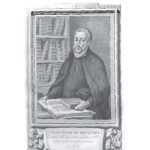Quote:
Because they are by nature slaves, barbarians, crude and cruel beings, they rejected the rule of the wise, powerful and noble, rather than accepting it for their own good as a principle derived from natural justice, according to which the physical body should be subjected to an expression of the soul, desire to reason, irrational animals to rational man; which is to say that the imperfect should be subjected to the perfect, the inferior to the superior.
Source:
Pius Onyemechi Adiele (2017): The Popes, the Catholic Church and the Transatlantic Enslavement of Black Africans 1418-1839. Hildesheim/Zürich & New York: Georg Olms Verlag, p. 159
Author Bio:
Juan Ginés de Sepúlveda (1494-1573) was a Spanish theologian, historian and philosopher.
Context:
 De Sepúlveda, who had never been to the Americas himself, believed that the indigenous peoples of the Americas deserved the treatment they were receiving because their way of life was blasphemous. During the Valladolid debate (1550-1551), he represented the interests of Spanish settlers and landowners. In the debate, which pitted him against the Dominican priest Bartolomé de Las Casas, the question was whether the enslavement of the indigenous peoples of America could be justified. In the first hundred years of the occupation of America, the indigenous population decreased by approximately 95% (75 million) due to murder and disease (Federici 2014: 103f.).
De Sepúlveda, who had never been to the Americas himself, believed that the indigenous peoples of the Americas deserved the treatment they were receiving because their way of life was blasphemous. During the Valladolid debate (1550-1551), he represented the interests of Spanish settlers and landowners. In the debate, which pitted him against the Dominican priest Bartolomé de Las Casas, the question was whether the enslavement of the indigenous peoples of America could be justified. In the first hundred years of the occupation of America, the indigenous population decreased by approximately 95% (75 million) due to murder and disease (Federici 2014: 103f.).Further Reading:
*Tzvetan Todorov (1982): The Conquest of America: The Question of the Other. New York: Harper & Row.
*BBC (2013): Las Casas and Sepúlveda from Racism a History. Dokumentarfilm.
*Silvia Federici (2014): Caliban and the Witch. Women, the Body and Primitive Accumulation. New York: Autonomedia.
Year:
1544